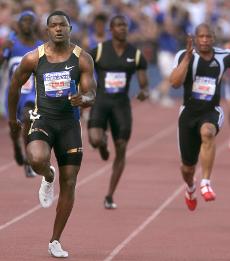IAAF: Gatlin’s coach could be suspended

Aug 1, 2006
LONDON – Justin Gatlin’s coach could face a two-year ban if the Olympic and world champion sprinter is found guilty of a second doping violation, the sport’s international governing body said Monday.
“Once we have enough evidence to prove it, then we have the power to prosecute him,” IAAF spokesman Nick Davies said, referring to Trevor Graham.
The International Association of Athletics Federations will only act should evidence link Graham to any doping violations and the U.S. Anti-Doping Agency decides not to take action against him, Davies said.
While USADA does not normally go after coaches, the U.S. Olympic Committee is looking into ways to hold them responsible if they’re involved in doping cases.
While not referring to Graham or Gatlin specifically, USOC spokesman Darryl Seibel said Monday that the federation has long been looking into ways to penalize coaches if they play a role in doping.
Get The Daily Illini in your inbox!
“That said, we believe there are others who carry significant influence with athletes who must also share in the responsibility for clean competition,” Seibel said. “Specifically, agents, coaches and trainers must also be held accountable when there is a pattern of doping positives.”
Published reports have identified Graham as the coach who sent USADA a syringe containing the designer steroid THG, which until then had been undetectable.
A man who worked with Graham told a San Francisco grand jury and investigators that he supplied performance-enhancing drugs to the coach and many of his athletes, including Marion Jones, Tim Montgomery, C.J. Hunter and Michelle Collins, the New York Times reported last week.
At least six athletes who trained under Graham have received doping suspensions. Graham, however, has always denied direct knowledge or involvement with drug use.
Meantime, Gatlin’s mother, Janet, said during a telephone interview that her son was staying at the family’s home in Pensacola, Fla., and was “doing as well as can be expected.”
Gatlin said Saturday he had been informed by the USADA that he tested positive for testosterone or other steroids after a relay race in Kansas in April. But he responded by saying that he has never knowingly taken or used banned substances.
If found guilty, Gatlin would face a life ban and the loss of the world 100-meter record. He equaled Jamaican Asafa Powell’s mark of 9.77 seconds in May, a month after the positive test. Gatlin would keep his Athens gold medal in the 100 and world 100 and 200 titles from 2005.
Gatlin was suspended in 2001 after testing positive for an amphetamine found in medication he was taking for attention deficit disorder. The IAAF gave him early reinstatement, but said the suspension remained on his record and he would face a life ban for any second violation.
The IAAF said it gave little credence to Graham’s claim that Gatlin was the victim of a massage therapist who rubbed testosterone cream on his legs without his knowledge.
“We have a strict liability rule that what’s in your body is your responsibility, so unless there was an independent witness who saw everything clearly there really isn’t a possibility that there would be something in that,” Davies said.





